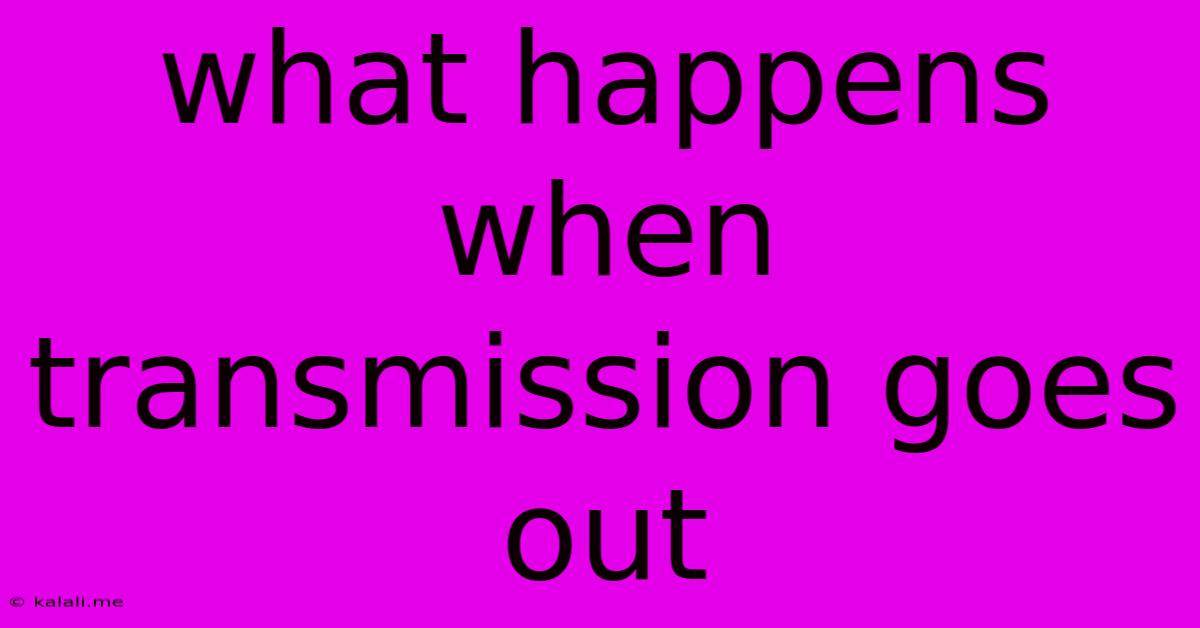What Happens When Transmission Goes Out
Kalali
Jun 03, 2025 · 3 min read

Table of Contents
What Happens When Your Transmission Goes Out? A Comprehensive Guide
Your car's transmission is a complex system that allows you to change gears smoothly and efficiently. When your transmission fails, it can leave you stranded and facing a costly repair. This guide explains what happens when a transmission goes out, the signs to watch for, and what you should do if it happens to you. Understanding these aspects will help you to be better prepared and potentially save you money and frustration down the road.
Understanding the Transmission's Role
Before diving into transmission failure, let's briefly touch upon its function. The transmission acts as the intermediary between your engine and the wheels, translating the engine's power into motion. It manages the torque and speed to allow for efficient acceleration, smooth driving at various speeds, and safe operation in different terrains. A properly functioning transmission is crucial for a safe and enjoyable driving experience.
Signs Your Transmission is Failing
Several warning signs indicate that your transmission is experiencing problems. Being aware of these can help you address the issue before complete failure:
- Difficulty Shifting Gears: Experiencing problems shifting gears, whether manually or automatically, is a major red flag. This might manifest as slipping gears, delayed engagement, grinding noises, or a complete inability to shift.
- Strange Noises: Unusual noises emanating from the transmission, such as whining, humming, clunking, or banging, often suggest internal damage or component wear.
- Slipping Gears: This occurs when the engine revs up but the car doesn't accelerate accordingly. This indicates a loss of grip between the gears and is a serious issue.
- Burning Smell: A burning smell coming from under the hood, often accompanied by a smoky exhaust, suggests that the transmission fluid is overheating, indicating potential friction and impending failure.
- Leaking Transmission Fluid: Low transmission fluid levels, often indicated by a leak underneath your vehicle, can lead to insufficient lubrication and ultimately transmission failure.
- Check Engine Light: A consistently illuminated check engine light, particularly accompanied by other symptoms, signals potential transmission problems. Consult your vehicle's manual or a mechanic to understand the specific code.
What Happens When Transmission Failure Occurs?
When your transmission finally fails, the consequences can vary depending on the specific issue. However, some common outcomes include:
- Inability to Shift Gears: You might find yourself completely unable to change gears, leaving you stuck in one gear or unable to move at all.
- Sudden Loss of Power: The engine might still run, but the car loses power, making driving extremely dangerous.
- Complete Vehicle Immobility: In severe cases, the transmission will completely seize up, leaving you stranded and requiring towing.
- Significant Damage: A complete transmission failure can lead to damage to other components, increasing repair costs significantly.
What to Do If Your Transmission Fails
If you suspect transmission failure, take immediate action:
- Pull over safely: Find a safe location to stop your vehicle, away from traffic.
- Turn off the engine: Avoid further stressing the transmission.
- Contact roadside assistance: Call for a tow truck to get your vehicle to a qualified mechanic.
- Avoid driving: Attempting to drive with a failing transmission can cause irreversible damage.
- Seek professional repair: Have your vehicle inspected by a qualified mechanic who specializes in transmissions.
Preventive Maintenance
Regular maintenance significantly reduces the likelihood of transmission failure. This includes:
- Regular fluid changes: Following your manufacturer's recommended schedule for transmission fluid changes is crucial for lubrication and cooling.
- Careful driving habits: Avoid harsh acceleration, abrupt braking, and excessive idling.
Ignoring transmission problems can lead to significant repair costs and potential safety hazards. Paying attention to warning signs and practicing preventative maintenance is key to ensuring your vehicle's longevity and safe operation. Remember, seeking professional help is always the best course of action when you suspect transmission issues.
Latest Posts
Latest Posts
-
Hissing Sound From Car Air Conditioner
Jun 05, 2025
-
What Does The Bible Say About Touching Breasts Before Marriage
Jun 05, 2025
-
How To Get Gum Out Of Rug
Jun 05, 2025
-
How To Make Potions Last Longer Minecraft
Jun 05, 2025
-
Elevator Wont Go To Floor After Pressing Button
Jun 05, 2025
Related Post
Thank you for visiting our website which covers about What Happens When Transmission Goes Out . We hope the information provided has been useful to you. Feel free to contact us if you have any questions or need further assistance. See you next time and don't miss to bookmark.